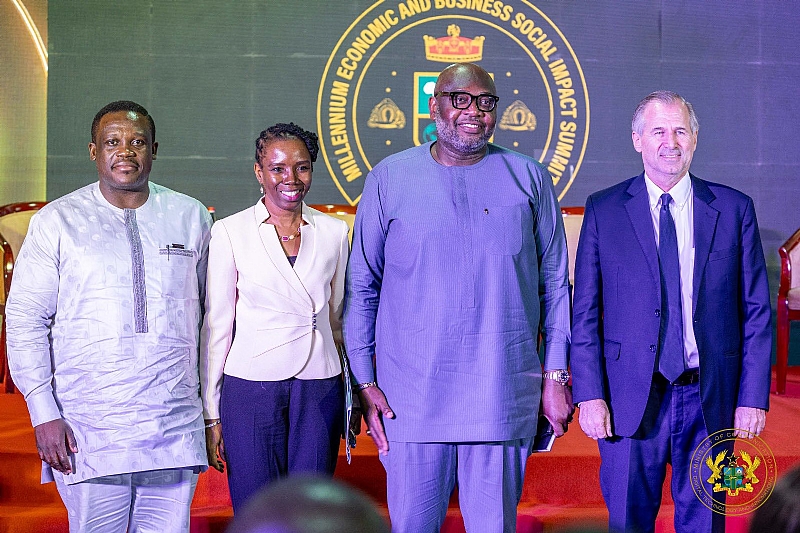The Premier Millennium Economic, Business & Social Impact Summit (MEBSIS 2025), held in Kumasi, Ghana, served as a crucial platform for discussing and strategizing Ghana’s economic transformation in the digital age. Mr. Samuel Nartey George, Minister for Communication, Digital Technology and Innovations, underscored the critical role of a supportive environment for digital transformation, emphasizing the need for strategic investments in robust digital infrastructure, regulatory reforms that promote innovation, and comprehensive digital literacy programs that empower citizens. He articulated the government’s vision for an inclusive, secure, and sustainable digital future, ensuring that every Ghanaian benefits from the opportunities presented by technological advancements. This vision aligns perfectly with the summit’s broader theme of “Sustainable Development Goals. A Vibrant Economy as a Catalyst for Transformation,” highlighting the interconnectedness of economic progress, technological innovation, and societal well-being.
Mr. George outlined the Ministry’s proactive approach to policy development, explaining how these policies are designed to promote financial inclusion, create new employment opportunities, and equip the workforce with the essential skills required to navigate the digital landscape. He highlighted the government’s commitment to building a future where technology empowers individuals, businesses, and communities across the country. This commitment reflects the Ministry’s understanding of the transformative power of technology to drive economic growth, improve access to services, and create a more equitable society. By focusing on these key areas, the Ministry aims to maximize the positive impact of digital transformation on Ghana’s overall development.
A major highlight of the Minister’s address was the discussion of Ghana’s 24-Hour Economy policy, an ambitious initiative designed to extend economic productivity beyond traditional working hours. He affirmed the government’s active engagement in implementing this policy, emphasizing the collaborative efforts between various ministries, businesses, and local governments. This initiative recognizes the potential of the digital economy to operate around the clock, thereby creating new avenues for economic activity and expanding opportunities for employment generation. Mr. George presented the 24-Hour Economy policy not merely as a future aspiration but as a project already in motion, demonstrating the government’s commitment to tangible action and concrete results.
MEBSIS 2025 served as a dynamic forum for diverse stakeholders, including business leaders, policymakers, investors, and entrepreneurs, to engage in constructive dialogue, explore opportunities, and forge partnerships aimed at bolstering economic resilience and fostering inclusive growth. The summit provided a unique opportunity for these key players to share insights, identify challenges, and collaboratively develop innovative solutions to drive sustainable development. By bringing together these diverse perspectives, MEBSIS 2025 fostered a collaborative environment conducive to developing effective strategies for economic progress.
The summit’s agenda focused on several key objectives, including exploring strategies for achieving economic resilience in the face of rapid technological advancements, fostering sustainable partnerships between public and private sectors, advancing financial inclusion to empower individuals and businesses, and promoting youth-driven innovation as a catalyst for growth. These objectives reflect a holistic approach to economic development, recognizing the importance of addressing multiple facets of the economy simultaneously. By examining these crucial areas, MEBSIS 2025 aimed to create a roadmap for sustainable and inclusive economic transformation.
Furthermore, the summit emphasized the importance of aligning economic transformation with the Sustainable Development Goals (SDGs), a globally recognized framework for achieving a more sustainable and equitable future. This alignment underscores the government’s commitment to incorporating global best practices into its development strategies. Discussions at MEBSIS 2025 revolved around key aspects of the SDGs, such as technological disruptions, cross-sector partnerships, and empowering youth and women in leadership and entrepreneurial roles. By focusing on these critical areas, the summit sought to contribute to the achievement of broader development goals and ensure that Ghana’s economic progress is aligned with global sustainability objectives.


